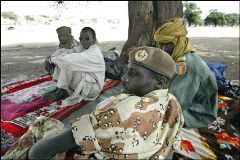Sudan rebel JEM wants Chad to pull out of Darfur talks
ABUJA, Nigeria, June 19, 2005 (AP) — A rebel group from Sudan’s troubled Darfur region issued a statement Sunday demanding Chad withdraw from peace talks in Nigeria, which have failed to make significant progress since they started last week.

|
|
A soldier of the Chad National Army rest in a position in the wadi Tine, the empty bed of a seasonal river that marks the border between Tine Chad and Tine Sudan. (file/AFP). |
The different parties haven’t yet held any face-to-face discussions because of the Justice and Equality Movement’s demand that Chad – up until now a key mediator – pull out of the talks.
Negotiators from the 53-member African Union, who have been shuttling between the different parties in private sessions, had to call off a meeting with the rebel group over the same issue earlier this week.
“The presence of Chad will be an obstacle to the current round of talks and a danger to peace in Darfur,” said a statement from Ahmed Tugod Lissan, the leader of the rebel group’s delegation.
It called on the African Union, which is organizing the negotiations, “to take swift and decisive steps to save the current round of talks.”
The statement accused Chad of being militarily allied with the Sudanese government, and of attacking Justice and Equality Movement bases within Sudan as recently as April. It also said Chad was trying to split the group.
Chadian chief mediator Allam-Mi Ahmed and embassy officials weren’t immediately available for comment. Ahmed has previously criticized the rebel group’s delegation – which is dominated by Darfur exiles – as made up of people with little on-the-ground experience, and said that it should include Darfur-based leader Mohammed Saleh Hakim.
Justice and Equality Movement spokesman Ahmed Hussain Adam said the group would meet with Nigerian President Olusegun Obasanjo late Sunday, although he didn’t say what would be discussed.
The talks aim to forge a peace accord between the Sudanese government and two rebel groups represented at the talks – the Justice and Equality Movement and the larger Sudan Liberation Army.
Previous peace accords have so far failed to end conflict in Darfur that has led to at least 180,000 deaths. Around 2 million other people have fled into the bush or relief camps in Darfur or neighboring Chad.
The Darfur conflict began when mainly ethnic African rebels launched an uprising in February 2003 against what they say were decades of marginalization and neglect.
Sudan’s Arab-dominated government and pro-government Arab tribal militia are accused of launching coordinated attacks on ethnic African farmers in retaliation, causing most of the deaths and displacements.
Sudan denies targeting civilians or allying with the militia known as Janjaweed.
